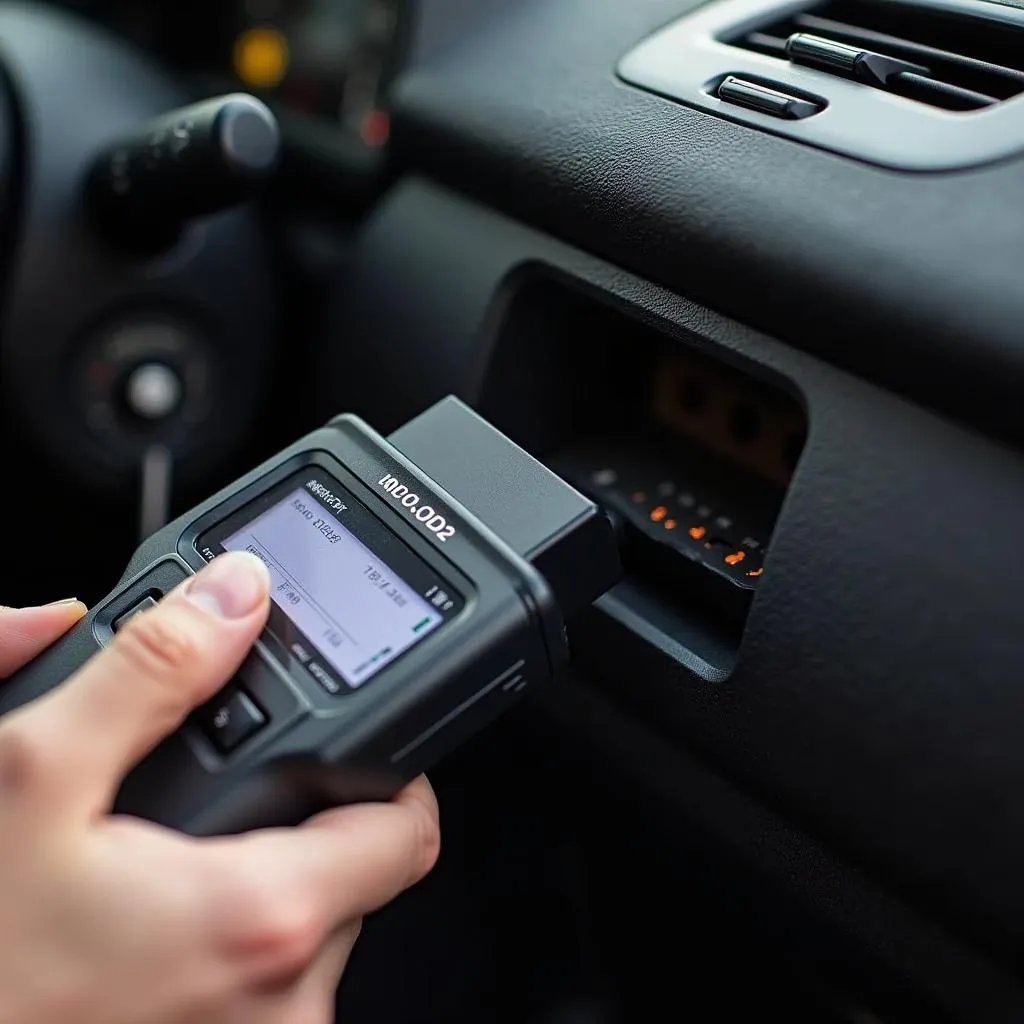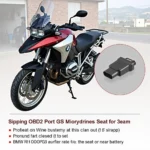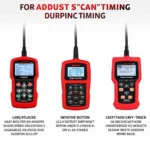Finding the best DIY OBD2 scanner for your needs can feel overwhelming with so many options available. These handy devices empower you to understand your car’s health, diagnose issues, and potentially save money on costly mechanic visits. Whether you’re a seasoned DIYer or just starting, this comprehensive guide will walk you through everything you need to know about choosing the best DIY OBD2 scanner for your needs.
Understanding OBD2 Scanners and Their Benefits
Before we dive into the specifics, let’s clarify what an OBD2 scanner is and why you might need one. OBD2 stands for On-Board Diagnostics, generation two, a standardized system in vehicles since 1996. An OBD2 scanner, also known as a code reader, plugs into your car’s OBD2 port (usually located under the dashboard) and communicates with its computer system.
These nifty devices offer several benefits for car owners:
- Read and Clear Check Engine Light: Easily identify the reason behind that pesky check engine light and clear it once the issue is resolved.
- Diagnose Car Problems: Gain valuable insights into your car’s health by reading diagnostic trouble codes (DTCs), which pinpoint the source of potential problems.
- Monitor Real-time Data: Access live data streams from your car’s sensors, like engine RPM, coolant temperature, and oxygen sensor readings, providing valuable information about your car’s performance.
- Save Money on Repairs: By identifying problems early on, you can address minor issues before they escalate into costly repairs, saving you money in the long run.
- Gain Peace of Mind: Regularly scanning your car provides peace of mind, knowing you’re staying on top of potential issues and ensuring a smoother driving experience.
Types of OBD2 Scanners: Choosing the Right One for You
OBD2 scanners come in various shapes and sizes, each offering different functionalities and price points.
1. Basic OBD2 Code Readers
These entry-level scanners are perfect for casual users who primarily want to read and clear check engine lights. They are budget-friendly and user-friendly, often displaying codes and their definitions directly on the device.
2. Bluetooth OBD2 Scanners
These versatile scanners connect wirelessly to your smartphone or tablet, allowing you to access a wider range of features and data through dedicated apps. They offer greater convenience and portability compared to basic code readers. The BAFX OBD2 power draw scanner is a popular option in this category.
3. Professional-Grade OBD2 Scanners
These high-end scanners offer comprehensive diagnostic capabilities, rivaling those used by professional mechanics. They often include advanced features like bi-directional control, allowing you to perform tests and actuate components, but come at a higher price point.
Factors to Consider When Choosing a DIY OBD2 Scanner
With the vast array of options available, choosing the best DIY OBD2 scanner can seem daunting. Consider these factors to narrow down your choices:
- Your Budget: Determine how much you’re willing to spend, keeping in mind that more features and functionality typically come at a higher price.
- Your Car’s Make and Model: Ensure the scanner you choose is compatible with your car’s make, model, and year.
- Features You Need: Consider what you want to achieve with the scanner. Do you need basic code reading and clearing, or are you looking for advanced features like live data streaming and bi-directional control?
- User Friendliness: Opt for a scanner with an intuitive interface and easy-to-understand menus, especially if you’re new to car diagnostics.
Top DIY OBD2 Scanner Recommendations
To simplify your search, we’ve compiled a list of highly-rated DIY OBD2 scanners across different categories:
Best Overall: BlueDriver Pro – Offering exceptional functionality, broad vehicle compatibility, and a user-friendly app interface, the BlueDriver Pro is an excellent all-around choice for DIYers of all levels.
Best Budget Option: Ancel AD310 – This compact and affordable scanner delivers reliable code reading and clearing capabilities, making it a great entry-level option.
Best for Live Data: Autel MaxiLink ML629 – With its impressive live data streaming capabilities, this scanner allows you to monitor various engine parameters in real time.
Best for Advanced Users: Innova CarScan Pro 5610 – Packed with professional-grade features like ABS and airbag system diagnostics, this scanner is perfect for experienced DIYers tackling more complex repairs.
Common OBD2 Scanner Questions Answered
Q: Can I use any OBD2 scanner on any car?
A: While most cars manufactured since 1996 use the OBD2 standard, compatibility can vary. It’s crucial to check the scanner’s specifications and ensure it supports your car’s make, model, and year.
Q: What do the OBD2 codes mean?
A: Each OBD2 code represents a specific problem or malfunction within your car’s systems. You can easily find code definitions online or through dedicated apps.
Q: Can I fix my car myself using an OBD2 scanner?
A: While an OBD2 scanner helps diagnose problems, it’s not a magic fix-it tool. It provides valuable information that can guide your troubleshooting and repair decisions. Depending on your skill level and the complexity of the issue, you can choose to tackle repairs yourself or seek professional help.
Q: How often should I scan my car with an OBD2 scanner?
A: It’s generally recommended to scan your car at least once a month or before long trips. Regular scanning allows you to detect potential issues early on and address them promptly.
Conclusion
Investing in the best DIY OBD2 scanner for your needs empowers you to take control of your car’s health, diagnose issues, and potentially save money on costly repairs. By understanding the different types of scanners available and considering your individual needs, you can choose the perfect tool to unlock valuable insights into your car’s inner workings.
Remember, regular car maintenance and timely repairs are crucial for a smooth and safe driving experience. Armed with the right knowledge and a reliable OBD2 scanner, you can confidently tackle car troubles and enjoy peace of mind on the road.
FAQ
1. What does an OBD2 scanner do?
An OBD2 scanner reads and displays diagnostic trouble codes (DTCs) stored in your car’s computer, helping you identify potential issues.
2. Are OBD2 scanners universal?
Most cars since 1996 use the OBD2 standard, but compatibility can vary. Check the scanner’s specifications to ensure it supports your car.
3. Can I clear my check engine light with an OBD2 scanner?
Yes, most OBD2 scanners allow you to clear check engine lights after addressing the underlying issue.
4. Do I need a professional-grade scanner for DIY use?
Not necessarily. Basic or mid-range scanners offer sufficient functionality for most DIYers.
5. Where can I buy a reliable OBD2 scanner?
You can find OBD2 scanners at auto parts stores, online retailers, and even some gas stations.
6. Are there any good OBD2 scanner apps?
Yes, several apps work with Bluetooth OBD2 scanners, offering advanced features and user-friendly interfaces.
7. Can an OBD2 scanner tell me when my car needs an oil change?
While some scanners provide basic maintenance reminders, they may not be as accurate as your car’s built-in system. Always consult your owner’s manual for recommended service intervals.
Still Have Questions? We’re Here to Help!
Need further assistance or have specific questions about OBD2 scanners at AutoZone or OBD2 sprint boosters? Don’t hesitate to contact our dedicated support team through WhatsApp at +1(641)206-8880 or email us at [email protected]. We’re available 24/7 to provide expert guidance and help you find the best solutions for your car diagnostic needs.
For more insights and helpful resources, explore our website for articles on topics like the Scanner Automotriz Launch OBD2 and the best app for OBD2 to read codes on a 7.3 engine.


